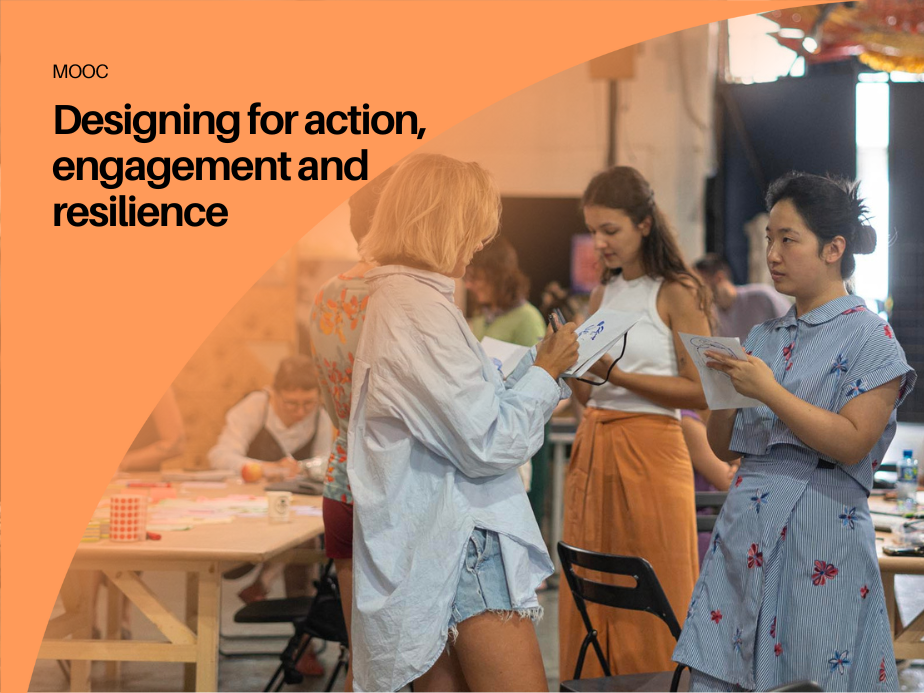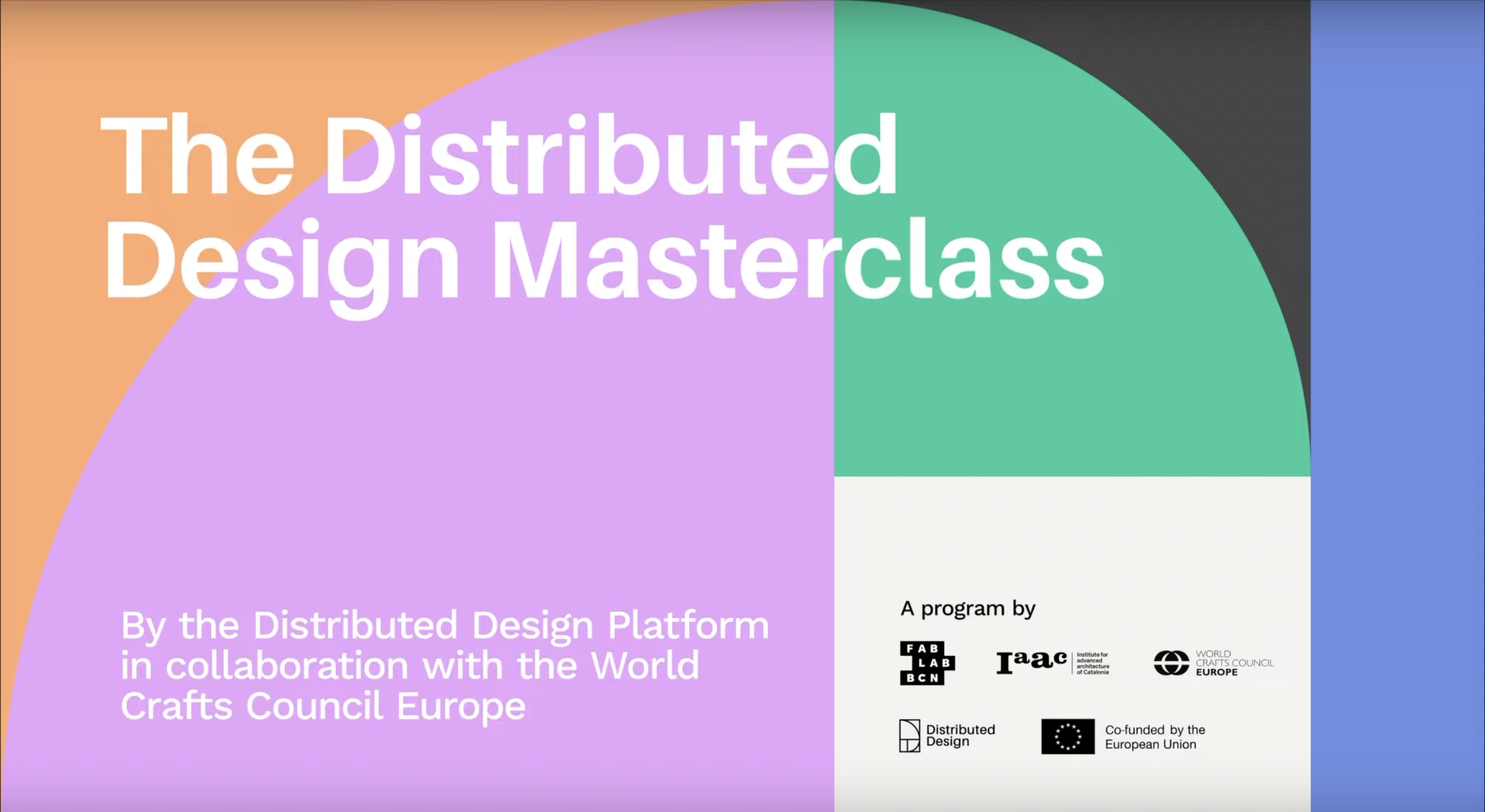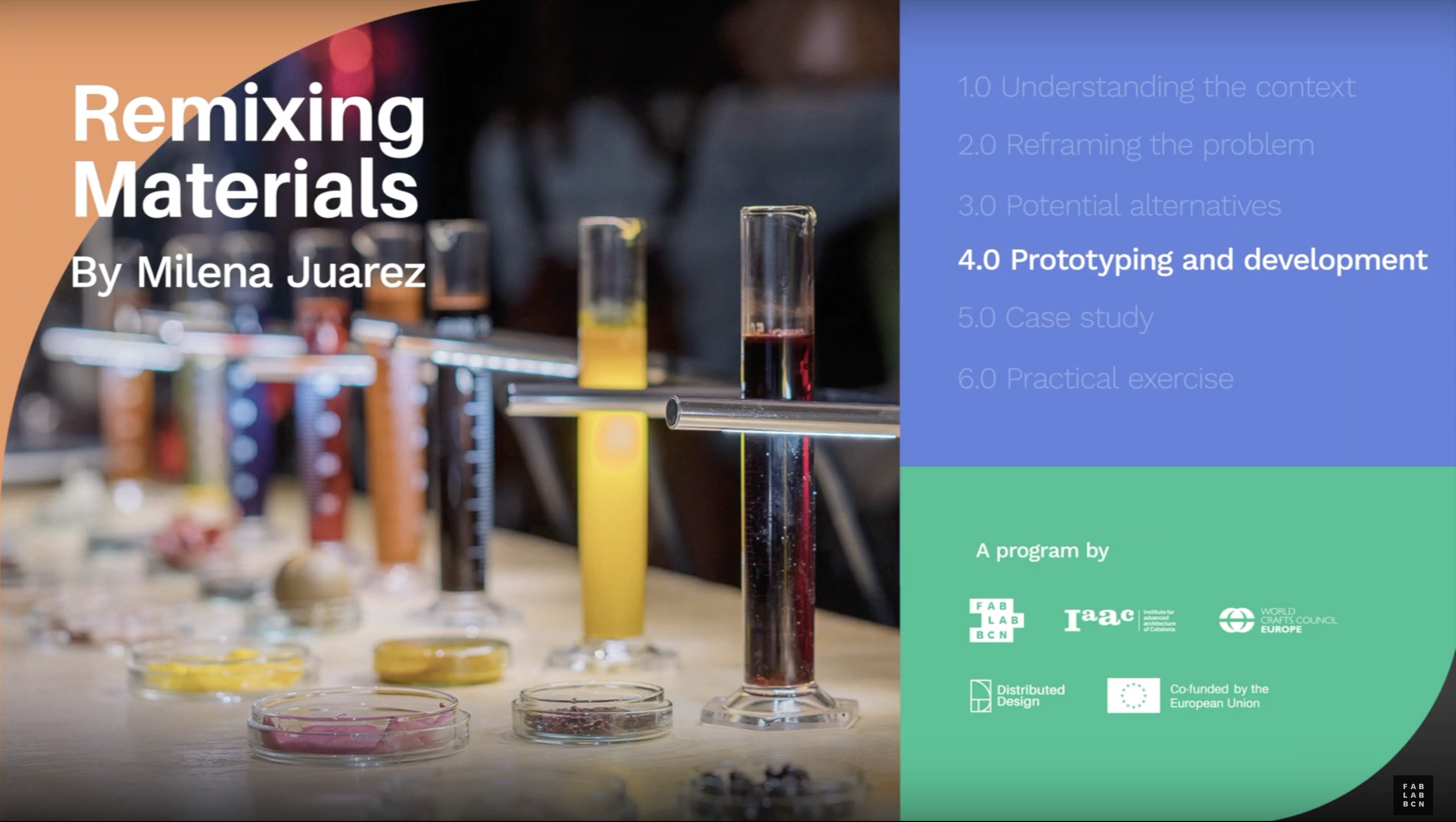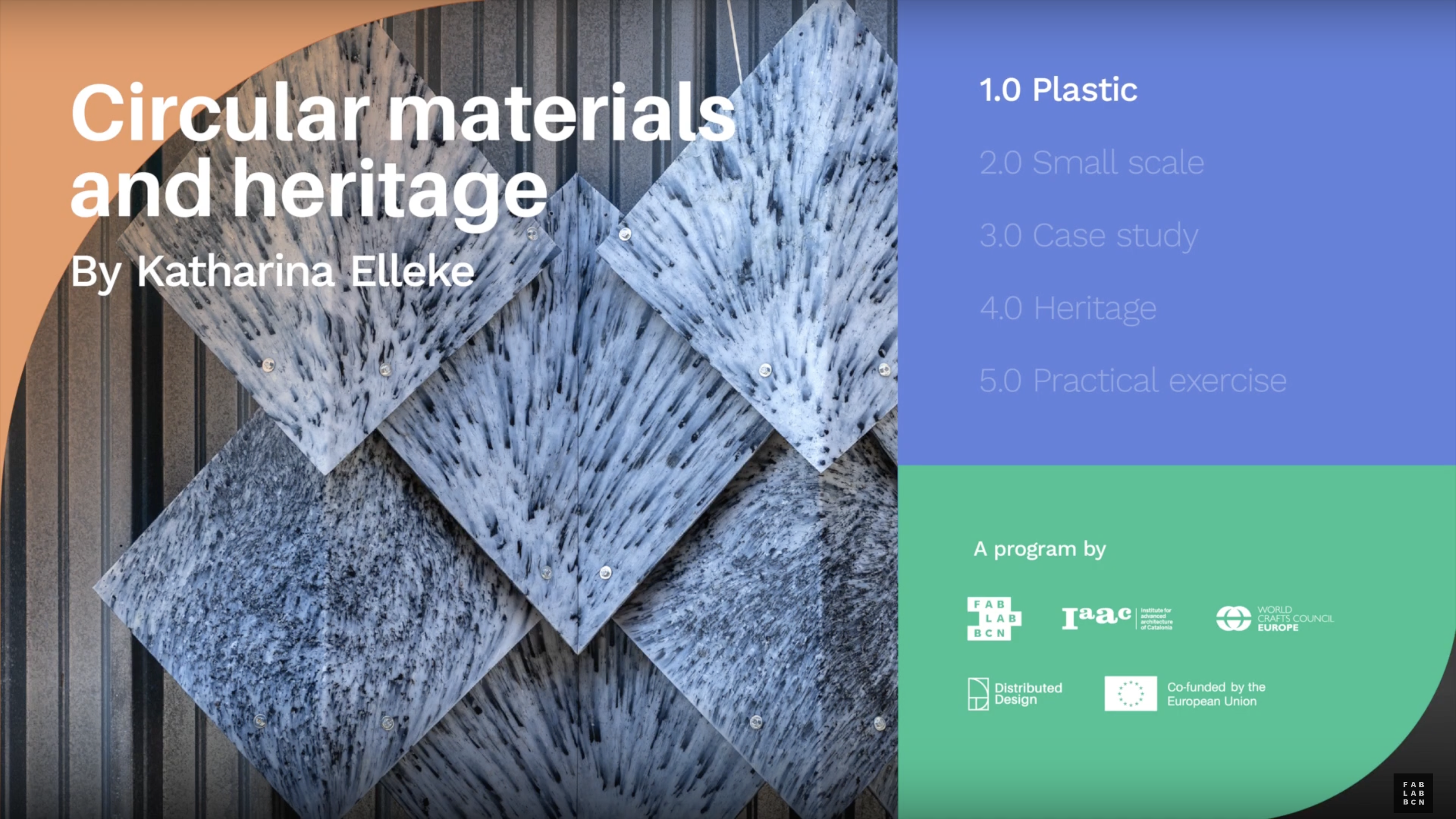Resources

[MOOC] Designing for action, engagement and resilience
A project by
Distributed Design Platform
About the project
Welcome to the MOOC “Designing for action, engagement and resilience”
The opportunity of remote collaboration, problem solving and manufacturing by the state of art of new technologies
Introducing the MOOC “Designing for Action, Engagement, and Resilience” featuring expert speakers in three captivating topics. Join us as we delve into the world of design and explore innovative approaches to create a positive impact in our communities and beyond.
In Topic 1, “Crafting the Future: Exploring Bio3Dprinting,” we have the privilege of learning from Petra Garajova and Eduardo Chamorro, industry pioneers in the field. Discover the fascinating world of bio3Dprinting and how it is reshaping the possibilities of design and manufacturing, pushing the boundaries of what can be achieved.
Next, in Topic 2, “Nurturing Collaborative Practices by (Re)mixing Materials and Maker Techniques,” Milena Juarez Calvo, an expert in collaborative design practices, will guide us through the transformative power of combining materials and maker techniques. Uncover new ways to foster collaboration, enhance creativity, and unlock innovative solutions through the remixing of materials.
Lastly, we have Katharina Elleke, an expert in community-building and tackling plastic pollution, leading Topic 3, “The Bottom-Up Approach – Building Community to Tackle Plastic Pollution (from Islands to the Worldwide Web).” Discover how communities around the world are coming together to address the pressing issue of plastic pollution and learn effective strategies to engage and mobilize individuals for sustainable change.
This MOOC is your gateway to unlocking the knowledge, skills, and insights needed to design for action, engagement, and resilience. Join us on this exciting journey and be empowered to make a difference through design.

Collaborative Practices with Open Design
Explore the boundaries of material science and digital manufacturing, in this mind-expanding masterclass.
In this session, participants will be able to gain a deeper understanding of the role of additive manufacturing with bio-based materials, the role of digital fabrication and new materials and how these technologies can be used to enable innovative forms of design processes. Exploring viable design alternatives to the current mass consumption paradigm.
Whether you are a craftsperson, designer, or maker, this masterclass will provide valuable insights on the capabilities of technologies such as the aforementioned.
Petra Garajova Designer and Shemakes Ambassador
Petra is a Slovak designer exploring the boundaries of material science, digital manufacturing and material innovation currently based in Barcelona. She is a Fabricademy alumna and she was also involved in the Shemakes.eu project as an Ambassador at the Icelandic Textile Center. Nowadays, she is working as a Fabricademy support instructor and lab assistant in the Fab Lab Barcelona. At the same time, she is a co-founder of p2.lab – Experimental Design Platform and Laboratory.
Eduardo Chamorro Architectural Technologist, Researcher and additive manufacturing expert
Eduardo Chamorro is an architectural technologist, additive manufacturing expert and researcher, focusing on digital fabrication, materials, robotics and emerging technologies.
He is currently a PhD candidate at Swinburne University (Melbourne, Australia) in High performance composites additive manufacturing for architecture.
Works as faculty and researcher at FabLab Barcelona & IAAC (Institute for Advanced Architecture of Catalonia) in Barcelona, Spain as faculty in the Master in Design for Emergent Futures (MDEF), Master for Advanced Architecture (MAA), Master in Advanced Ecological Buildings (MAEB), 3D Printing in Architecture (3DPA), FabAcademy at IAAC FabLab Barcelona. For him, working in a multi-scalar environment must be the priority of architects nowadays. His research focuses on the implementation of additive manufacturing technologies along different architectural scales imaging multiple processes and materialities.
Eduardo holds a Master’s Degree in Architecture from CEU San Pablo University (Spain), a Fab Academy diploma in Digital Fabrication offered by the Fab Lab Network and a Master’s Degree in Advanced Architecture from IAAC (Spain), with a specialisation in digital fabrication, materiality novel design methodologies. He holds as well a Spanish architectural licence.
Moreover, he has worked as Fab Lab Seoul director, researcher at several architecture studios, professor of computational design and fabrication at CEU University and advisor for various architecture collectives. He is also a regular collaborator at Fab Lab Madrid. He is always seeking innovative architecture that attempts to solve and adapt to social needs. He has also been a tutor for the Master of Science in Computational and Advanced Design (MSc CAD) at Design Morphine – UACEG (University of Architecture, Civil Engineering and Geodesy).

Nurturing collaborative practices by (re)mixing materials and maker techniques
Is it possible to propose a learning space to encourage collaboration through food waste crafting and biomaterials design?
Blending artisanal techniques with digital fabrication allows for the exploration of innovative recipes for current design and environmental challenges. When combined with the engagement of local communities, synergies and opportunities can be better identified, and outcomes can maximize value creation.
In this module, we will explore iterative prototyping strategies for biomaterials innovation fueled by intrinsic people creativity and interactions with peers, the local community, and future users.
Milena Juarez Calvo Communities Expert
Milena Juárez is a Brazilian sanitary and environmental engineer with a Master’s degree in Interdisciplinary Studies in Environmental, Economic and Social Sustainability and a specialisation in Urban and Industrial Ecology at the Autonomous University of Barcelona. With extensive research experience, Milena has actively participated in several interdisciplinary projects on circular economy, resilient cities, co-creation and sustainable food. At Fab Lab Barcelona, she currently coordinates the local pilot of the CENTRINNO project. She has participated as an action researcher in REFLOW, SISCODE, FoodShift and European funded projects. As community engagement lead at Fab Lab Barcelona, Milena supports local activities at Fab City Hub Barcelona, a distributed hub, to co-design strategies for a more circular, productive and inclusive city model.

The bottom-up approach – Building community to tackle plastic pollution (from islands to the worldwide web)
Making change through individuals might seem tiring and unrealistic, but taking that path (rather than relying on industrial or political changemaking) has its very own strengths. This session is about empowering and working with communities to take ownership of transforming their polluted environment to the better – through DIY recycling machines, distributed design & education, inspiring art & creations, a global family of plastic recyclers and a moving vessel made from what people call ‘waste’.
When Katharina Elleke (Industrial Designer from Munich) focussed her activities on environmental issues, and particularly on plastic waste, she got involved in The Flipflopi Project (Kenya) as well as Precious Plastic (Netherlands), both projects aiming to tackle plastic pollution – one with an online community building, designing, hacking and exchanging around DIY recycling machines, and the other with a traditional sailing dhow made out of recycled plastic, sailing around East Africa to create a movement to end single use plastic.
As both projects have been run by a small team of volunteers, Katharina has been involved in basically every area connected to them – from strategy, planning and coordination, communication and community building, video filming and editing, machine building and testing, process documentation, as well as educational trainings and guidance for projects (e.g. in Bangladesh and Algeria).
Currently, she is based in Kenya at The Flipflopi Project, leading the R&D to build a big recycled plastic boat and building a school for locals to learn the skills of traditional carpentry and dhow building and how to combine that with modern technology and materials in a sensible and sustainable way.
